#// 'elle is in her teenager phase of development'
Explore tagged Tumblr posts
Text
LOUISE JEAN MCCARY: ALL ABOUT EMMA STONE’S DAUGHTER

Louise Jean McCary is the daughter of actress Emma Stone and writer-director Dave McCary. She was born one year after her parent’s wedding. If you are interested in learning more about Louise Jean and her parents, we have all the information you need. Read on to find out more.
Louise Jean McCary- Birth and Age
Louise Jean McCary was born on March 13, 2021, in California, United States to actress Emma Stone and writer-director Dave McCary. As of 2023, little Louise Jean is a bubbly 2-year-old, born under the zodiac sign of Pisces.
Emma Stone’s journey toward embracing motherhood has been a beautiful evolution. In a candid interview with Elle back in November 2018, she shared how her perspective on having children had changed with time. Stone, who had never considered marriage or children as a teenager, changed her mind as she aged. She stated, “I now desire to get married and have children.”
Entering her thirties brought a sense of clarity and purpose to Stone’s life. She reflected on the transformative nature of this phase, acknowledging the ups and downs that shaped her journey.
David Lawrence McCary — Father
David Lawrence McCary is an immensely talented American comedian, writer, and director, and is the father of Louis Jean McCary. From 2013 to 2019, McCary served as a segment director for the legendary show Saturday Night Live, showcasing his comedic prowess to a worldwide audience. He was also the main director for the first two seasons of the popular web series Epic Rap Battles of History.
McCary’s journey in comedy began during his college years when he co-founded the sketch comedy group Good Neighbor. This collaborative endeavor allowed him to explore his creative instincts and develop his unique comedic style. He encountered his old friend Kyle Mooney during this period, who would become pivotal to his professional life.
In 2017, McCary took on the role of director for the comedy-drama film Brigsby Bear, a project produced by The Lonely Island. This venture showcased his versatility and ability to seamlessly blend humor with deeper storytelling elements.
McCary’s affiliation with Saturday Night Live commenced in 2013 when he joined the show as a segment director for its thirty-ninth season. Collaborating once again with his Good Neighbor comrades Kyle Mooney and Beck Bennett, who joined as featured players, and Nick Rutherford, who joined as a staff writer, McCary brought his unique comedic vision to the iconic show.
David Lawrence McCary’s remarkable journey in comedy and direction has made him a respected figure in the industry. His contributions to Saturday Night Live, Epic Rap Battles of History, and various other creative projects have solidified his place as a comedic visionary, leaving audiences eagerly awaiting his next artistic endeavor…Read More
Source: Foolic
0 notes
Note
Purely Hypothetical Question: How do you think a Robert-return storyline in the Bower era might have gone? Maybe during Andrew's teen rebel phase or maybe in the aftermath of Rebecca leaving? How do you think Robert would fit with the overall feel of the Bower era?
Incheresting question, it’s literally been haunting my because it’s kind of asking me to go against the very fabric of what the bower era stands for. I always thought that the bower era said ‘the past is a closed book’ you know?
I actually think I’d be more inclined to enlist Summer for this storyline than Andrew, just because he doesn’t really seem like he cares about this sort of thing. Not in the sense that he’s a bad person or anything, he just has his own situation with Paul that he’s involved with. But, I feel like Summer would maybe be interested in Robert anthropologically? She had a journalist arc similar to Elle, and I can envision her deciding to confront (?) Robert maybe?
I think the ball is sort of in Rob’s court, though. He chooses to accept or deny visitors when they come to him.
Also, I think Bower era would take a more ‘mental health’ based approach to Robert rather than the sensationalist ‘he’s bad and evil always and forever except when he isn’t approach that the Herbison era took. Just because it’s a more ‘grounded’ era. Like, in the sense that the stories have typically lower stakes then they might have in Funbus or Herbs era. Elle’s first year she nearly died in a plane crash, Andrew’s first year he threw a party and had to clean a bathroom. You see how these are fundamentally different levels to be operating on. We’d get more about Robert’s actual psychology, and steps he has taken to improve his mental health, as more of Paul’s ‘He’s not evil, he’s sick’ mentality he had up until Herbs era decided to take that from us. But, mental health is also used to keep Steph sympathetic after she kills Ringo and I see no reason why they wouldn’t give Rober the same grace.
So, after Sumer decides to confront Robert to interview him, Andrew would find out through a series of event and decide to accompany her to the prison mostly out of concern for her wellbeing rather than any interest in Robert. And, Robert would accept because that’s what the narrative demands of him. I don’t know that I can ever see Robert coming back full time - Part of the magic is that he is a character we don’t see more than a few times. Bower era did have a habit of allowing characters to overstay their welcome, so I think we’d actually see a lot more of him if they wanted to do this kind of story.
Andrew would keep it secret from Paul, because duh. I feel that not speaking to Paul would be detrimental to Andrew and Robert as people, but it would be great for them to develop a relationship. And from Summer, from everyone. Robert is like, the only person who Andrew feels like understands that his relationship with Paul is kind of like, perpetually at rock bottom. We would see scenes of Andrew having typical teenage complaints about his absent, emotionally neglectful father, and Robert (unintentionally) kind of goading him into it.
I’d also want to see scenes of people trying to discourage Andrew from having any kind of relationship with Robert. Zeke maybe? Warning Andrew that Robert messed up his sister, and Andrew’s own sister really badly, and he shouldn’t play with fire. I don’t really want adults involved yet.
As for Robert’s part, I think he would be customarily jealous of Andrew like he was of Dylan. Especially when you add in that Paul fought for Andrew, but not the triplets. Textually, Paul has always very badly wanted to be in Andrew’s life but really did sort of abandon the triplets. I don’t think he’s hurt Andrew on purpose, he has no beef with him and it would not help him achieve a goal. Butttt he might try and manipulate him to get to Paul/Elle, not realizing that Andrew and Elle have no relationship. He can’t fathom that he would be anyone’s first choice, let alone first choice in older brother. He would, at least at the start, try to do right by Andrew but because of inherent flaws in his personality he can’t help but to manipulate him. To what ends, I’m not sure Robert would even know. He can’t help but to turn Andrew further against Paul.
I suppose I see this storyline ending with Andrew crossing a line (not sure when this would be taking place, probably either during or just before hooking up with Summer) and saying something to Paul that is straight out of Robert’s mouth and him being shaken to the core by this and asking him ‘who told you that’ and Andrew saying that he’s been to see Robert and he knows ‘the truth’ whatever that means. This opens the door for Paul to have a moment of emotional vulnerability with Andrew, and gives them the opportunity to fix whatever has happened in their relationship has soured and we probably never hear from Robert again. Lol.
I think Robert would for sure be a straight bad guy with sympathetic elements for Bower Era. The villains (to my memory) were occasionally interesting but rarely especially complex. There’s no reason to keep him sympathetic without Harlow, and the writing in Bower era is intelligent enough that I think they can handle a storyline about manipulation with grace. Idk man, this was a hard question!
0 notes
Text
sosu elle & the fo4 dlc
// i’m at the point where i really just kinda need to... sit down and have a good, hard think about elle’s sosu verse and the themes and where i want it all to go. i still need to finish nuka-world, but i think? i hope? that maybe i have the gist of how elle feels about the place and a vague idea about what she’ll want to do with it
interestingly, all the story dlc seem to have the effect of reminding elle of who she is, one way or another
automatron speaks to specific fnv feelings about “i’ve fucked up and done more harm than good, how do i live with myself, how do i move on” (+ eyebot buddies). elle gets to tell isabel stories about the burned man, about soldiers following orders, about an AI who tried to get her killed but became her best friend. (and not about some brains-in-jars who DEFINITELY caused more harm than good when they thought they were only doing good, unfortunately. curse you, think tank conditioning, even if they kind of had a point about it.) elle gets to revisit her memories of her friends and the people who she feels built her up when she didn’t know who she was or where to start figuring that out
in far harbor, elle stares down a mirror of herself in dima. (except for how willing dima is to erase his memories. that... that’s a whole ‘nother Thing.) and at the same time, the island reminds her so much of the mojave, despite environmentally being, like... the complete opposite. but an area that’s mostly wilderness, instead of being mostly urban, when you’re out there and it’s you against the land trying to survive... far harbor talks about how they’re tough and proud and independent and how that makes them different, but it makes elle think of primm and goodsprings and novac and freeside and — it makes her think of the people back home. and the children of atom... the children of atom are the only people on the island who welcome her with open arms. sure, she has to take drugs, kill a bear again before that, but once she’s one of them? she’s one of them. they embrace her openly and tell her welcome home and the nucleus is so oddly peaceful. not to mention, that vision... there really is something in the fog, something powerful and strange and old, something that also reached out and said, welcome home
if automatron is a story where elle remembers her friends (who she came from), far harbor is a story where she remembers where she came from
nuka-world... nuka-world hits on some very specific traumatic chords there at the beginning, which isn’t a great thing, especially since it pulls her back to dead money of all things, but — in doing so? it helps her go back to her roots, too. dead money is so critical to her development in any verse, and by default happens so early — and when nuka-world pulls elle back to dead money, it’s pulling her back to before she started wrapping herself in all her layers of emotional isolation. and that isolation is, i think, the crux of her development in her sosu verse. the damage it does to her, and how she copes with it, especially as her new friends start pulling her out of it, even if on accident... and nuka-world pulls her out of it, too, just in a, uh, less nice way
oh? what’s that? “what about vault 88,” you ask? okay, i guess vault 88 doesn’t really have that kind of an impact. elle refuses to do the experiments and instead hands the space over to the railroad. it’s nice and straight-forward and not an emotional hurdle. vault 88 is the exception to the rule
but anyway — on TOP of all of the, “[mufasa vc] simba remember who you are” going on, there’s also the question of... how much elle trusts herself to be that person. and... how much she WANTS to go back to that. obviously, it’s ideal if she re-learns how to be open again and let herself make friends, because she does SO BADLY on her own, emotionally speaking. but... she didn’t WANT to be in the middle of everything last time. and, last time, she got people she cared about killed (house, clone of ED-E, even kind of dog/god... and she failed to save elijah for veronica). she didn’t feel as though she won the dam — it was only because of everyone else’s plans and support. (massive imposter syndrome wrapped around some truth.) and she doesn’t want anything in the commonwealth to be dependent on her, the way vegas became dependent on her...
it really seems like... if her new vegas arc was about gaining confidence in her skills and her ability to bring people together and her ability to make decisions — maybe her sole survivor arc is about her finally deciding who she wants to be?
#( OOC. mun ) please direct your attention to the tour guide#( VERSE. sole survivor elle ) maybe i need the truth to bring me home again#// a lot of tl;dr that culminates in#// 'elle is in her teenager phase of development'#// i jest but there are some definite parallels
3 notes
·
View notes
Text
I watched a couple of movies! (Part 1)
Back when I regularly had the luxury of long breaks, I spent my days binge-watching films, as you can see from my extensive knowledge of 80s chick flicks and all the cheesy tropes and disgustingly adorable, predominantly white leading men that come with them. Sadly, a side effect of growing older in the digital age seemed to be the diminishment of my attention span: the only things I could focus on were academic requirements, simply because I had to. But, thanks to several factors—the suspension of online classes, the sudden annoyance I developed towards Barney Stinson that prompted me to discontinue How I Met Your Mother, etc.—I decided it was high time to rekindle this lost love. So, here is an unsolicited review of the 17 films I managed to finish in a little over a week! Rest assured, I tried my best to venture out of familiar territory and brush up on some of the more cultured picks, according to Letterboxd, at least.
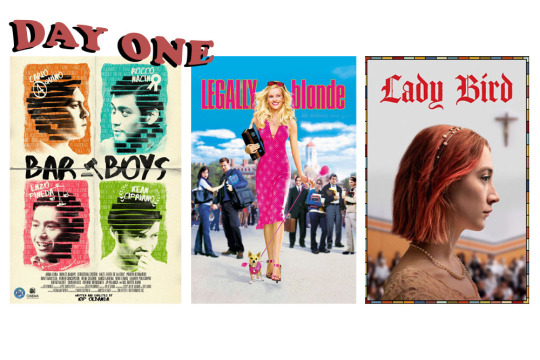
Bar Boys (2017, dir. Kip Oebanda) ★★★
The film that kickstarted everything, which I never would have seen if the director had not uploaded the full version on YouTube. This well-meaning tale of four best friends (Carlo Aquino, Rocco Nacino, Enzo Pineda, and Kean Cipriano) and the challenges they face in law school—terror professors, fraternities, and financial difficulties included—does have a lot of heart, and is sensitive enough to show how the effect of this experience differs depending on a student's background. But, what it lacked for me was a certain degree of specificity: I think the same premise would have been applicable in med school, or any other post-graduate degree for that matter. So, why did the characters choose law? I also would have appreciated some commentary on the shortcomings of the country’s justice system, and further fleshing out of the characters so the audience could have seen why we could count on them to fill in the gaps.
Legally Blonde (2001, dir. Robert Luketic) ★★★½
The rating might be surprising, considering that the courtroom scene was responsible for the short law school phase I had in Grade 5. As if I could ever make use of the rules of haircare in an actual cross-examination. Of course, I am compelled to admire Elle (Reese Witherspoon) and how her motivations for going to Harvard shift from winning back a boy to discovering what she never knew she had and using these gifts to help those around her (especially the manicurist, who I feel was given way more exposure than what was due to her). Ultimately, though it was inspirational at some points, it felt too good to be true and impossible to relate to. (But then again, shouldn’t there be a willing suspension of disbelief when consuming forms of media such as this?)
Lady Bird (2017, dir. Greta Gerwig) ★★★★★
I’ll probably end up making a separate post dedicated to this movie and how it singlehandedly called me out, as a sensitive, occasionally self-important product of an all-girls Catholic high school. For now, I am forced to condense my overflowing feelings into a couple of sentences. Lady Bird takes place over the course of the titular character's senior year, a pivotal moment in the lives of all teenagers. But, instead of focusing solely on the formulaic firsts like the normal coming-of-age film would, it shines a light on her dwindling relationship with her equally strong-willed mother. Saoirse Ronan’s colorful performance as the human embodiment of my pre-teen self's conscience, and Greta Gerwig’s tremendous ability to make even oddly specific scenes speak to any viewer shine through and speak to me the most, and easily make this gem something I will be recommending this to anyone who bothers to ask for as long as I live.
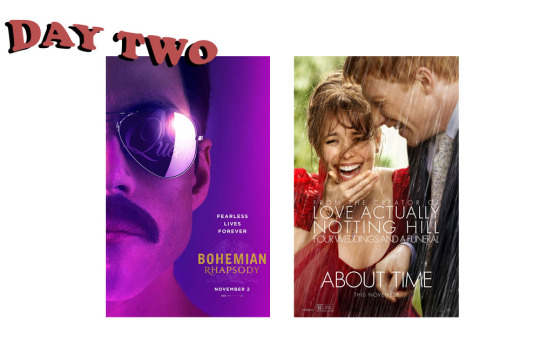
Bohemian Rhapsody (2018, dir. Bryan Singer) ★★★
There’s a lot of controversy surrounding Bo Rhap, particularly its failure to portray Freddie Mercury in a manner that does him justice. While I understand that it is a valid concern for fans of the band, I admit I don’t know enough about who he was as a person to criticize the film in this aspect. Regardless of its factuality, this still was just average for me, the typical rise-and-fall type of biopic that is indicative of a rockstar’s legacy, but with laughably faulty editing. The redeeming factors were Rami Malek’s brilliant portrayal of the legend himself—his Live Aid performance gave me chills that lasted the entire 20 minutes, how alarming—and, obviously, the soundtrack that I kept on loop for several days.
About Time (2013, dir. Richard Curtis) ★
Apparently, this movie focuses on Tim (Domhnall Gleeson), who discovers at age 21 that the men in his family have the power to time-travel and thus revise and repair certain parts of their lives. He uses this to address the fact that he’s never had a girlfriend, and effectively so as he ends up bagging Mary (Rachel McAdams), a charming American who is the settler in this relationship by default. But, of course, this gift is not without its dire consequences—or at least, that’s what it says on Wikipedia. It’s hard to trash on this and admit that I bailed halfway because so many of my friends swear by this. But, I just couldn’t stomach the lack of chemistry between the two leads; the surprisingly boring dialogue for a screenplay crafted by Richard Curtis of Notting Hill fame; and the story that, although bore enough of a resemblance to “The Time Traveler’s Wife” to be interesting, was still not powerful enough to sustain my attention.
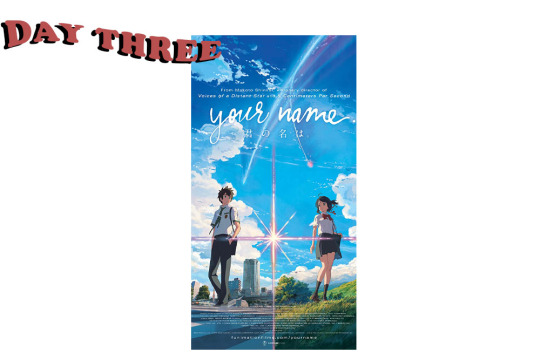
Your Name (2016, dir. Makoto Shinkai) ★★★★★
I’m a huge fan of plots that are sure to make my eyes swell and heart hurt—I can’t explain the psychology behind this either. So when this was recommended to me and I had made it through an hour without shedding a single tear, I was prepared to be disappointed. But, the events leading up to the conclusion proceeded to rip me into shreds, as if to taunt me and say, “You asked for it.” Mitsuha (Mone Kamishiraishi) and Taki (Ryunosuke Kamiki), teenagers living on opposite sides of the country, suddenly start switching bodies following the appearance of a comet. This unexplainable phenomenon causes them to forge an unbreakable bond that transcends the very limits of time and space. I know the description is not much, but it’s best to experience this unique plot for yourself. Besides its storyline, its charm lies in its excruciating attention to detail in depicting life in urban and rural Japan, both in the realistic animation of one picturesque scene after another, and the use of cultural elements to arrive at a twist viewers will not see coming.
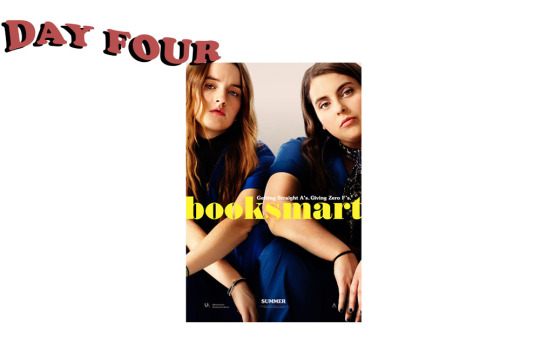
Booksmart (2019, dir. Olivia Wilde) ★★★★½
I can't summarize what I imagine Booksmart to be for teenagers in the future, so here's an entire scenario: It's the year 2070. Two young girls of around 16 are sprawled on their bedroom floor, watching this on whatever device they use for streaming. (Maybe it's from an LCD projector embedded in their foreheads, who knows.) The credits roll, and they instantly think to themselves, "Man, we were born in the wrong generation!" (They simultaneously think of doing a high-five, and without raising their hands themselves, it happens because that's technology.) Anyway, Amy (Kaitlyn Dever) and Molly (Beanie Feldstein) are best friends who played by the rules all throughout high school and realized too late that they could’ve afforded to have a little more fun. On the eve of their graduation, they decide to cram four years’ worth of adventure in a single unpredictable and outrageous night, getting to grips with everything that comes their way in an exceedingly comedic yet refreshing fashion. Also, the protagonists have such a genuine and wholesome relationship: the way they hyped up their most ridiculous looking outfits, or overshared borderline uncomfortable stories is honestly my personal definition of an ideal friendship.
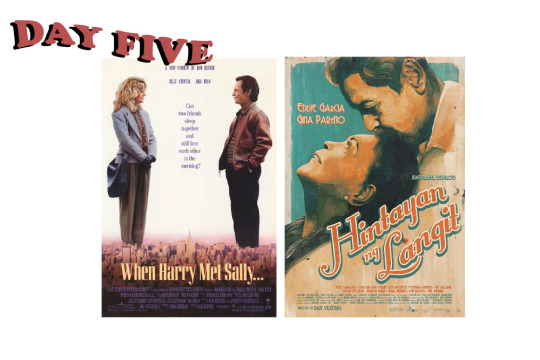
When Harry Met Sally (1989, dir. Rob Reiner) ★★★★½
Despite this film’s constant presence in every “chick flicks you must watch” list I’ve bothered searching up, I spent a huge chunk of my teen years in constant protest against the decision to cast Billy Crystal as the male lead instead of, I don’t know, literally any other actor on the planet. But, once I finished it, I realized that he’s a much better fit than I thought. The laidback Harry to Meg Ryan’s finicky Sally, both of them spare no effort exploring and debunking truths and misconceptions about modern relationships: examples of which are the idea of being high maintenance, and the quintessential question of whether a guy and girl can ever be just friends. Although their dynamic is the definition of slow burn, audiences can’t help but earnestly root for the pair—the frustration brought by the several almosts pay off in the end, as they lead to one of, if not, the most romantic love confession scene.
Hintayan ng Langit (2018, dir. Dan Villegas) ★★★★½
This tale adapted from a play by no less than Juan Miguel Severo is set in purgatory—a grandiose art museum-four star hotel hybrid of sorts—where souls can stop and rest while their papers for entry to heaven are being processed. It is here we meet Manolo (Eddie Garcia) and Lisang (Gina Pareno), ex-lovers with unfinished business. Things admittedly start off a bit slow, but it's understandable since there needs to be ample provision of context regarding the standard operating procedures of this unique waiting area. Once that’s done, the focus stays on the main actors, who drive audiences to tears with their powerful performances, and thought-provoking questions on matters of betrayal, forgiveness, and the afterlife. The ending had me rocking back and forth like a baby, my shirt soaked with tears, so do take heed and stock up on tissues!
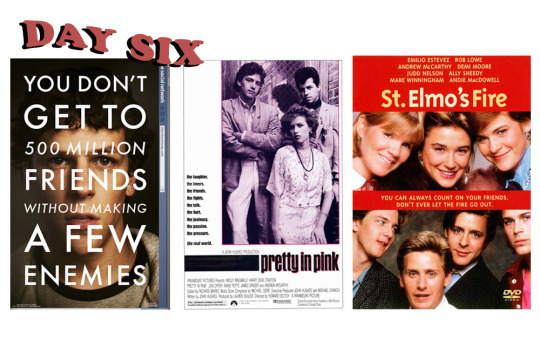
The Social Network (2010, dir. David Fincher) ★★★★★
Within its packed first 15 minutes alone, you can easily see what makes The Social Network an example of cinema at its finest: an intoxicated Mark Zuckerberg (Jesse Eisenberg) hacks into the websites of all Harvard dorms to create Facebook’s oldest ancestor from scratch, in an attempt to get back at his ex-girlfriend. The atmosphere is tense, the dialogue is loaded with witty one-liners and powerful insight, and the actors are so in touch with their characters they practically fuse into a single person. This remains consistent for the next two hours or so, making for an enjoyable and fast-paced, yet still informative glimpse into the human side of what is arguable the most powerful company of this era. I also heard that it’s much more fun if seen with the cast commentary on, so I’m gonna have to find a copy of that for myself!
Pretty in Pink (1986, dir. Howard Deutch) ★★★★★
I’m cheating here, I know: this has been a long-time favorite, but I guess I can still give a review if I was still 15 when I last saw this. Andie (Molly Ringwald) and Blane (Andrew McCarthy)’s classic “poor girl + rich boy = happily ever after” story is masterfully tackled by John Hughes, who manages to inject equal amounts of swoon-worthy romance and biting criticism of the inherent class divide in society. Others would argue that Duckie (Jon Cryer), Andie’s devoted best friend, is the true star of the show, and while I do agree that he has his shining moments (if you listen closely, you can hear Try A Little Tenderness playing softly in the background), I sadly inherited my mother’s adoration for Andrew, which I will pass on to my child and so on—truly the defining characteristic of our lineage.
St. Elmo’s Fire (1985, dir. Joel Schumacher) ½
I understand that being an adult in the Real World is bound to come with some grave mistakes and lapses in judgment. But, not a single character in this friend group redeems themselves by the end. While Ally Sheedy’s Leslie and Mare Winningham’s Wendy were just borderline forgettable (why did the latter even end up here with the Brat Pack?), Judd Nelson’s Alec cheats on his girlfriend and believes that marriage is what will make him change his ways; Rob Lowe’s Billy neglects the family he didn’t plan on having by fooling around with other women and making a home out of his favorite bar; Demi Moore’s Jules relies on cocaine and extramarital affairs to hide trauma she refuses to process, and Andrew McCarthy’s pretentiously cynical Kevin suddenly claims he knows what love is when Leslie pays attention to him for 10 minutes. But, none of them compare to Emilio Estevez’ Kirby, the sociopath obsessed with a girl he barely knows. It honestly resembles some sick contest of how many problems this gang can cause before they end up behind bars, with the last scene being a lazy and rushed attempt to wrap everything up, in the name of this surface-level “friendship”.
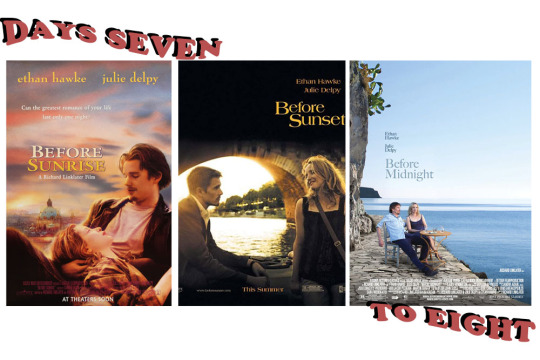
Before Sunrise, Sunset, and Midnight (1995, 2004, 2013; dir. Richard Linklater) ★★★★★
Guess it’s better to admit it now, but I made this post as an excuse to rave about how beautiful this trilogy is, the most authentic depiction of love in its purest form. Sunrise has been recommended to me by both friends and the Netflix algorithm, but I put off watching it again and again and again. I mean, what could I possibly get out of looking at two strangers roam around Vienna? Well, to answer that question: quite a lot. Jesse (Ethan Hawke) and Celine (Julie Delpy)’s relationship spans an entire trilogy, and throughout that period, they manage to define then destroy the idea of having a soulmate to call your own in approximately six hours. But certain constancies are present in each movie: the emotion intense even in the smallest of gestures (you don't understand the anguish I feel when the scene at the listening booth randomly pops in my head), the dialogue truly thought-provoking and natural, the settings so picturesque, and the chemistry of the actors so electric I have trouble believing that the director didn’t actually invade the personal space of a real couple and eventually get issued a restraining order.
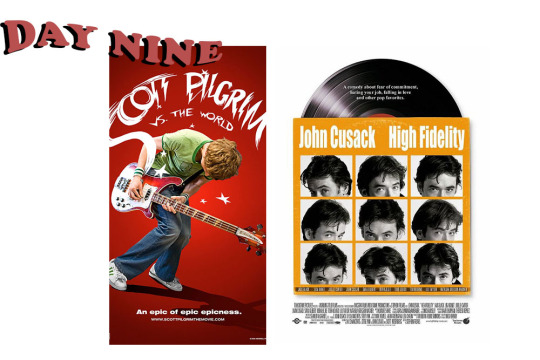
High Fidelity (2000, dir. Stephen Frears) ★★
I’d like to think of this as an essay: I'm confident that the introduction is the protagonist Rob's soliloquy on his five biggest breakups to understand why he’s so flawed that everyone always leaves him, and the conclusion his attempt to win his ex Laura (Iben Hjejle) back. But as for the body, I’m not entirely sure. Interspersed between these moments are thoughtful top five lists of anything that can be enumerated, and occasional banter with the employees at his record store that may be charming, but do not enhance the film in any way, shape, or form for me. Also, I normally enjoy seeing John Cusack onscreen, but more often than not, he was nagging in front of the camera instead of talking to the people around him; no wonder his relationships failed!
Scott Pilgrim vs the World (2010, dir. Edgar Wright) ★★★
I wanted to enjoy this so bad, I swear! Sadly, the one thing I gained after seeing this is knowledge of where the “I’m So Sad, So Very Very Sad” meme came from. I get that it’s supposed to resemble a comic book or video game, and maybe the reason why I failed to appreciate this as much is because I was never a fan of either. I found the prolonged action scenes surprisingly boring, the storyline too fantastic, and the whole quest of having to defeat seven monstrous exes for the hand of a manic pixie dream girl not worth it in the end. Although I can’t give it less than three stars given its impressive visual effects, and appeal to the entire Tumblr community (gamers on one end, millennial film connoisseurs on the other), it’s definitely not something I would watch a second time.
There will surely be more where that came from! (I mean it. Since completing this post, I’ve finished another five films.) If you wanna keep tabs on what I’m watching without having to wait on another post, you can give my Letterboxd a follow. Wishing you love and light always, and don’t forget to wash your hands and pray for our frontliners!
#recs#angeltriestoblog#life dump#movies#movies to watch during quarantine#or at least movies I'VE watched over quarantine#so far#17 films are u CRAZY!!!!#i have carpal tunnel#quarantingz
0 notes
Text

➰ ( SHELLEY HENNIG, CISFEMALE, SHE/HER) *✧.:°░。 —- is that LORELAI “RORY” FELL ?! you know them, right? they are the TWENTY FIVE year old WEREWOLF !! they’re known for being GENEROUS & ENDURING - but i’d be careful if i were you because they’re also IMPULSIVE & RECKLESS.
so hi i’m elle, i’m always down for plots and friendship. okAY SO HERE’S A BIT ABOUT THE GAL.
born and raised new yorker, rory grew up to a single mother in brooklyn. her dad had died when she was seven years old, just after her brother was born. whilst they were never wealthy, the fell’s were not as poor as many of their friends. nancy fell worked her ass off to put food on the table and made sure her little ones were never hungry. whilst rory rarely speaks of these times, she remembers them as the happiest ones in her life.
everything changed when she was seven on an upstate field trip with her girl guides troupe. the girls were out camping when rory went wandering. she had always been curious, headstrong and determined to prove that she could do anything herself and the young girl wanted to go exploring. on this occasion a rogue wolf attacked; rory managed to hide herself inside the roots of a tree but not without sustaining some injuries.
when she returned home, rory was not the same mundane girl. she was young but not naive and figured out what she was becoming when the phases of the moon began to affect her. for years, she learned to deal with being a wolf on her own. she believed herself to be a monster and kept herself away from anything to do with that part of her. she buried the wolf that so desperately wanted out.
but then she heard about other wolves. and that curiosity that had been her downfall once again could not be resisted. she was just a teenager when she fell in with a growing new york pack. they were considered rivals to the main pack within the territory. rory had never learned enough about the history of her kind or the shadow world to know that she was on the wrong side. when she was eighteen, she fell in love. he was a member of her pack and showed her all the fun of being a wolf. but he was also hot tempered, violent, and at times bloodthirsty. he wanted to tear the rival pack apart, to hurt and turn mundanes, and he wanted rory to be his at all times. feeling suffocated and scared of who the boy she loved had become, she changed allegiances and helped the main pack. they took on rory’s old pack and anyone that went up against them was killed. they didn’t find the body of her boyfriend, so she believed he fled whilst injured and would never return.
however over the years her boyfriend grew obsessed with the memory of her and in his warped mind decided that they only reason she had left him was because of her mundane family. they were holding her back from being a true wolf. so he began developing a plan to free her. a couple of years ago, rory came home from her shift at the bar to find the apartment in shreds. her mothers body lay in a puddle of blood in the kitchen, her younger brother left clinging onto life in his room. rory managed to get him to a warlock, who helped keep him alive, but on the full moon it was confirmed. her brother was now a wolf too.
after this horror, rory and her brother fled to the opposite side of the country and have been living in LA ever since. she has picked up a job in a bar and works to protect them both. she agreed to join this program after she found out her brother was joining because she wants to keep an eye on him. she never wanted him involved in the shadow world.
UPDATES
last Halloween she was put under a spell which meant that she tried to attack and hurt her friends and other partygoers. she still gets nightmares about that.
her ex-boyfriend found her in LA and took her younger brother hostage in their apartment. she returned to protect him and was taken captive as well. nick (her ex) believed that if he killed her brother, she would be his again. luckily, due to the bond she was able to scratch "help" into her skin and her partner felt it. they sought out leo, lukas, faye and ben who came to her rescue. they set rory and her brother free and she killed nick.
#( she does not walk; she runs instead // introspection )#tw: death#tw: abuse#tw: murder#tw: violence#tw: blood#wilshire:intro
4 notes
·
View notes
Note
Regarding how it’s interpreted in other cultures: I grew up in Europe speaking mostly French (and a couple of other languages, but I didn’t use them enough to understand the nuances of romance). Nowadays, French has adopted a lot of English vocabulary, so a lot of people will say “j’ai un crush sur X” for “I have a crush on X”. When I was at school though (2000s to mid-2010s), the two expressions I heard most were “j’aime X” and “je suis amoureux.se* de X”.
“Amoureux.se” is an adjective derived from “amour” (love), so it basically means “in love”. It has an extremely romantic connotation. You’d never say “je suis amoureux.se de ce film” like you could say “I’m in love with this movie” in English. It exclusively refers to romantic attraction, and usually it’s the initial phase before it’s reciprocated, but it can describe a reciprocated relationship as well. I’ve had friends tell me about their long-term partners, “je suis vraiment amoureux.se de lui/elle” (I’m really in love with him/her). It also seems kind of technical and official to me - it’s the term my sex education book used, and the one most people use to objectively describe a state of infatuation.
“Aimer” can mean to love or to like. You can say it romantically about a person, or to express that you like something (ex. “j’aime ce film”). When it is used romantically, it’s somewhat euphemistic - young teenagers tend to say “j’aime X” rather than “je suis amoureux.se de X” because “amoureux.se” seems more intense somehow? But also, “je t’aime” is what a couple says to each other, like “I love you” in English. It can also be used platonically, towards friends or family, but if there’s a chance it could be taken romantically you would add an adverb, like “je t’aime bien” (I quite like you), “je t’aime beaucoup” (I like you a lot), or “je t’aime tellement” (I like you so much).
For declarations of romantic attraction, young teenagers (10-13ish) would say either “je t’aime” or “je suis amoureux.se de toi” but I think I’ve heard “je t’aime” more often, again because it seems less intense and straightforward. Older teenagers wouldn’t so much declare their feelings as ask the other person to be in a relationship (”tu veux sortir avec moi?” literally “do you want to go out with me?”). As far as I know, though my knowledge is obviously limited, adults tend to just suggest a romantically-coded activity, like going to the movies or having dinner together. “Je t’aime” is said later on in the relationship, though I’m not entirely sure when - presumably when they’re committed.
There aren’t really any terms for non-romantic attraction, like “squish” or “friend crush”, which made things complicated for me growing up. One of my friends invented the expression “coup de foudre amical”, literally “friendly lightning bolt” - “coup de foudre” is a metaphor for instant attraction or love at first sight, so a “coup de foudre amical” would be when you hit it off with someone and quickly develop a squish. As far as I’m aware, nobody else uses it though.
*Just to be clear, I’m using the inclusive spelling, so the masculine form is “amoureux” and the feminine form is “amoureuse”.
How do you feel about squish, swish, lush, and smush? Many people like them but I find them viscerally uncomfortable. Not only are they weirdly cutesy and infantilizing, but "this is a crush but for INSERT ATTRACTION HERE" seems like a lazy substitute of romantic vocabulary for feelings that aren't romantic. Often attraction doesn't fit in boxes like that. I do understand no one has to use it if they don't like it, but it's like it's trying to fill in a perceived void left by being aspec.
I suppose a way to approach this is to explain how I feel about the phrase “I have a crush on X” and the ways in which I see it transform into “I am (in love with)/(attracted to) X”. Crush as a term tends to be used most by young people, and is, as with the other terms, a cutesy term in many ways. Its usage over time seems to have made people treat it as less cutesy, but I don’t see anything contextually more cutesy or infantilizing about squish, lush, etc than crush. But where does this change? When, culturally do I see people, largely in my age group, making this change?
In my current college experience, I have pretty direct experience with both groups right now. What I’m seeing is that people who use the phrase “I have a crush on X” typically mean “I like X romantically/sexually, but there’s no way they’d ever like me, right? even if they did like me, I’m insecure about my worth to them. I probably won’t approach them ever, despite my attraction”. When people say “I’m in love with X” (with a serious tone, often with some embarrassed or nervous tics) and typically mean “I like X romantically/sexually, and I’m considering/planning to shoot my shot. I am secure enough in myself to say that whether or not something comes out of it, I will feel okay with that in time.”
Does this mean that I think of people who use the term crush immature, young, or insecure? In all honesty, yes-- but I don’t think that those are explicitly things to feel ashamed of! It’s just a stage of life, and if you’re truly concerned about it (especially in terms of insecurity!) I really would have to recommend therapy. I have pretty low self-esteem, and I can acknowledge that. I’m at a point where I can say that I am confident in some respects, and not in others, and that’s okay (thank you therapy).
With that said: I personally felt like they were fun when I was younger. Squish especially was a useful and fun term for me coming to terms with being aro. I wouldn’t be surprised if other people had similar experiences with many of these terms.
I am frustrated when people, often well-meaning, seem to think others should categorize all of their attraction. Additionally, I find it personally concerning to treat aesthetic or platonic attraction, for example, to the prefix-labeling system of “hetero”, “bi”, etc. I think that if this system is to ever be furthered, we need to have more discussion about the intent involved in each type of attraction. What is our human brain getting from each of these? Are they useful terms when we critically examine them? i don’t have answers for these questions, and I’m not honestly emotionally available to handle that right now. I don’t think it’s important, even, to question right now, until the a-spec communities can settle a little more*
As far as filling the void goes, I don’t really see that in this particular context. In talking constantly about how aro culture is about friendships and how we treat our friends? That I see. In attempting to break down different aspects of what we typically condense as “attraction” or “love” without further exploration, and giving these some names on a theme? Not as much.
Basically, filling a void is a problem to me if we condense an experience into one aspect vs diversifying the term. I honestly think I would prefer if we just used the term crush with modifiers the way we use the word attraction, but that’s me.
*this is definitely in regards to the treatment of allosexual aros by the ace community, and the treatment of people who don’t fit into the allosexual/asexual binary by all sides. this aro doesn’t see a good discussion about the limitations of terms happening until we get this more resolved
#sorry this was so long i hope it's interesting to you!#also re the original question: i find the terms cutesy but no more so than 'crush' and either way they're REALLY useful to have#even though i still feel tempted to use 'crush' because it makes my feelings seem more legitimate#i'm still working through the belief that romantic feelings are necessarily stronger andmore meaningful than platonic ones#romance#aroace
46 notes
·
View notes